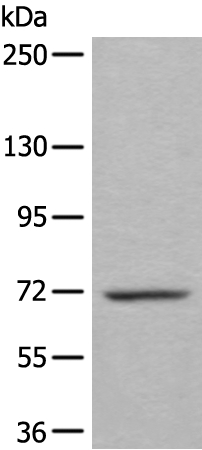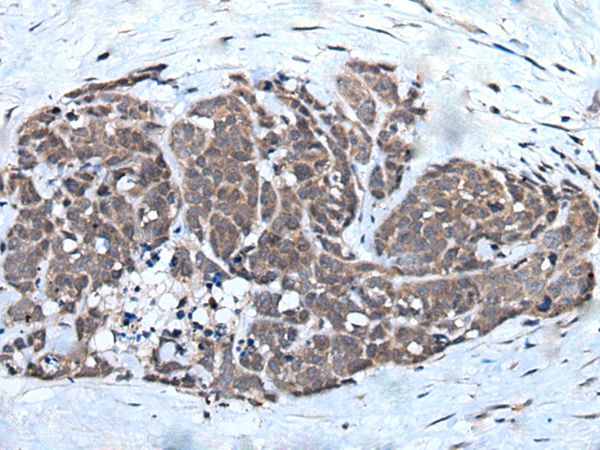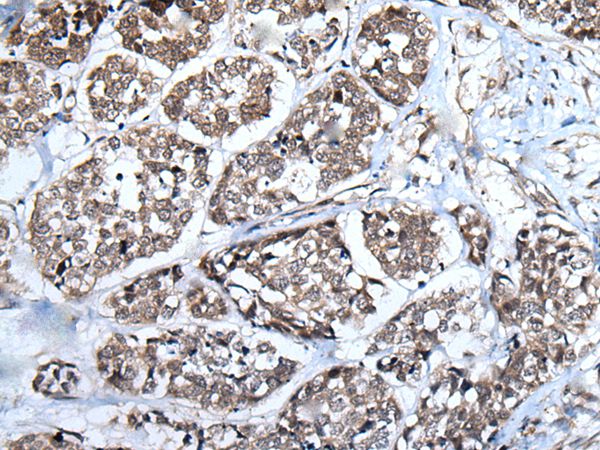


| WB | 咨询技术 | Human,Mouse,Rat |
| IF | 咨询技术 | Human,Mouse,Rat |
| IHC | 1/ 20-100 | Human,Mouse,Rat |
| ICC | 技术咨询 | Human,Mouse,Rat |
| FCM | 咨询技术 | Human,Mouse,Rat |
| Elisa | 咨询技术 | Human,Mouse,Rat |
| Aliases | WEE1A; WEE1hu |
| Entrez GeneID | 7465; |
| WB Predicted band size | 72kDa |
| Host/Isotype | Rabbit IgG |
| Antibody Type | Primary antibody |
| Storage | Store at 4°C short term. Aliquot and store at -20°C long term. Avoid freeze/thaw cycles. |
| Species Reactivity | Human,Mouse,Rat |
| Immunogen | Synthetic peptide of human WEE1 |
| Formulation | Purified antibody in PBS with 0.05% sodium azide. |
+ +
以下是3篇与WEE1抗体相关的代表性文献(内容基于公开研究概括,具体文献请通过学术数据库验证):
---
1. **文献名称**: *"Targeting WEE1 kinase in cancer therapy: Beyond checkpoint inhibition"*
**作者**: Hirai, H., et al.
**摘要**: 该研究探讨了WEE1在癌症治疗中的多重作用,开发了一种高特异性WEE1单克隆抗体(ADCT-301),验证了其在抑制肿瘤细胞周期和增强化疗敏感性中的效果,并通过免疫组化证明了WEE1蛋白在多种实体瘤中的过表达。
2. **文献名称**: *"WEE1 inhibition enhances anti-tumor immune response through PD-L1 downregulation in ovarian cancer"*
**作者**: Matheson, C.J., et al.
**摘要**: 研究利用WEE1抗体(克隆号:A12)进行体外和体内实验,发现抑制WEE1可通过降低PD-L1表达增强T细胞介导的肿瘤杀伤,提示WEE1抗体联合免疫疗法的潜力,并通过流式细胞术验证抗体特异性。
3. **文献名称**: *"Pharmacological characterization of a novel WEE1 antibody-drug conjugate for solid tumors"*
**作者**: Magnussen, G.I., et al.
**摘要**: 报道了一种新型WEE1抗体偶联药物(ADC),使用人源化抗体靶向WEE1的胞外结构域,在临床前模型中显示显著抑制肿瘤生长,并通过质谱分析验证了抗体与WEE1蛋白的结合表位。
---
**提示**:建议通过PubMed或Google Scholar以“WEE1 antibody”、“WEE1 inhibitor therapeutic”等关键词检索最新文献,部分研究可能涉及抗体开发、诊断应用或机制探索。
WEE1. a serine/threonine kinase, plays a critical role in cell cycle regulation by enforcing the G2/M checkpoint. It phosphorylates and inhibits cyclin-dependent kinase 1 (CDK1), delaying mitotic entry to allow DNA repair and maintain genomic stability. Dysregulation of WEE1 is linked to cancer progression, as many tumors exploit its function to survive replication stress caused by oncogenic signaling or chemotherapy. This makes WEE1 a promising therapeutic target, with inhibitors like adavosertib currently under clinical investigation to disrupt checkpoint control in cancer cells.
WEE1 antibodies are essential tools for studying its expression, localization, and activity in both normal and pathological contexts. They are widely used in techniques such as Western blotting, immunohistochemistry (IHC), and immunofluorescence to quantify protein levels across tissues or assess subcellular distribution. High-quality WEE1 antibodies exhibit specificity for distinct phosphorylation sites (e.g., p-Ser642), enabling researchers to probe activation states. In cancer research, these antibodies help identify tumors reliant on WEE1 for survival, predict responses to targeted therapies, or evaluate resistance mechanisms. Additionally, they facilitate mechanistic studies exploring how WEE1 interacts with pathways like p53 or ATM/ATR signaling. Validated antibodies are crucial for ensuring reproducibility in preclinical studies and advancing translational applications, such as biomarker development for WEE1-targeted therapies.
×